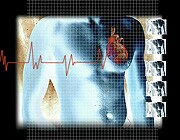
SUNDAY, June 20 (HealthDay News) — Among older men, having a high testosterone level is associated with a raised risk of heart disease or a heart attack, new research suggests.
The finding, from a new U.S. National Institutes of Health-funded study, concerns men over the age of 65 and is based on a tracking of hormone levels and heart disease among nearly 700 community-dwelling men.
Study author Dr. Kristen Sueoka, a resident physician at the University of California, San Francisco, is scheduled to present the finding Sunday at the Endocrine Society’s Annual Meeting and Expo, held in San Diego.
“The study finding contradicts smaller studies that have shown that testosterone levels are not associated with higher rates of cardiovascular disease,” Sueoka said in a news release from the Endocrine Society.
“Many in the general public are using testosterone supplements for various medical problems, including low sex drive and mood disorders, which are not life-threatening. These men may unknowingly be placing themselves at higher risk for cardiovascular disease,” she added.
None of the study participants were on any testosterone replacement therapy at the time of the study. Over an average of four years of follow-up, the study authors found that 100 of the men (14 percent) experienced either a heart attack, unstable angina (considered a pre-heart attack warning sign), and/or angioplasty or bypass surgery to clear clogged arteries.
The research team further noted that men at the highest end of the testosterone spectrum had more than twice the risk for coronary disease than men with the lowest testosterone levels.
“One day testosterone measurements may be used to help predict which men are more likely to develop cardiovascular disease,” Sueoka suggested. “But we need more studies to confirm that high testosterone is a risk factor for heart disease.”
More information
For more on risk factors for heart disease, visit the American Heart Association.

